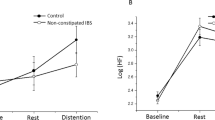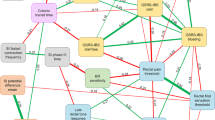Abstract
This study comprises assessment of autonomic function in irritable bowel syndrome (IBS) patients, focusing on meal-related changes. In 18 IBS patients (4 males, mean age 45±3.0 [SEM] years) and 19 healthy volunteers (6 males, mean age 41±3.5 years) blood pressure, heart rate, heart rate variability and muscle sympathetic nerve activity (MSNA) were assessed before, during and after consumption of a standardized meal. In pre- and postprandial phase Valsalva maneuver, cold pressor test (CPT) and deep breathing test were carried out and Visual Analog Scale (VAS) scores for nausea, bloating and pain were obtained.
In the IBS group, the meal induced significantly higher VAS scores for pain (P=0.002) and bloating (P=0.02). During food intake, the increase in blood pressure, heart rate and MSNA was equal in patients and controls, but the increase of LF/HF ratio of heart rate variability was significantly higher in the IBS group (median [quartiles] 2.29 [1.14–3.00] versus 0.77 [0.25–1.81]; P=0.03). IBS patients scored lower on pre- and postprandial RRmax/RRmin ratio during deep breathing (DB ratio, P=0.03). The increase in MSNA (burst frequency) in response to CPT tended to be higher in the IBS patients (P=0.07). We conclude that reactivity to food intake, measured as muscle sympathetic nerve activity, is normal in IBS patients. The lower DB ratio and higher LF/HF ratio during food intake in IBS patients is an indication of a reduced parasympathetic reactivity. These results suggest that reduced baseline activity as well as responsiveness of the parasympathetic system could play a role in the pathogenesis of IBS.
Similar content being viewed by others
References
Accarino AM, Azpiroz F, Malagelada JR (1995) Selective dysfunction of mechanosensitive intestinal afferents in irritable bowel syndrome. Gastroenterology 108:636–43
Burke D, Sundlof G, Wallin G (1977) Postural effects on muscle nerve sympathetic activity in man. J Physiol 272:399–14
Camilleri M (2001) Management of the irritable bowel syndrome. Gastroenterology 120:652–68
Chelimsky G, Chelimsky T (2001) Familial association of autonomic and gastrointestinal symptoms. Clin Auton Res 11:383–86
Cox HS, Kaye DM, Thompson JM, Turner AG, Jennings GL, Itsiopoulos C, Esler MD (1995) Regional sympathetic nervous activation after a large meal in humans. Clin Sci (Colch) 89:145–54
Dapoigny M, Stockbrugger RW, Azpiroz F, Collins S, Coremans G, Muller-Lissner S, Oberndorff A, Pace F, Smout A, Vatn M, Whorwell P (2003) Role of alimentation in irritable bowel syndrome. Digestion 67:225–33
Drossman DA (1999) The functional gastrointestinal disorders and the Rome II process. Gut 45(Suppl 2):II1–II5
Eckberg DL (1980) Parasympathetic cardiovascular control in human disease: a critical review of methods and results. Am J Physiol 239:H581–H593
Elsenbruch S, Orr WC (2001) Diarrhea- and constipation-predominant IBS patients differ in postprandial autonomic and cortisol responses. Am J Gastroenterol 96:460–66
Evans PR, Bennett EJ, Bak YT, Tennant CC, Kellow JE (1996) Jejunal sensorimotor dysfunction in irritable bowel syndrome: clinical and psychosocial features. Gastroenterology 110:393–04
Fagius J, Berne C (1994) Increase in muscle nerve sympathetic activity in humans after food intake. Clin Sci (Colch) 86:159–67
Ford MJ, Miller PM, Eastwood J, Eastwood MA (1987) Life events, psychiatric illness and the irritable bowel syndrome. Gut 28:160–65
Heitkemper M, Burr RL, Jarrett M, Hertig V, Lustyk MK, Bond EF (1998) Evidence for autonomic nervous system imbalance in women with irritable bowel syndrome. Dig Dis Sci 43:2093–098
Heitkemper M, Jarrett M, Cain KC, Burr R, Levy RL, Feld A, Hertig V (2001) Autonomic nervous system function in women with irritable bowel syndrome. Dig Dis Sci 46:1276–284
Kanazawa M, Endo Y, Whitehead WE, Kano M, Hongo M, Fukudo S (2004) Patients and nonconsulters with irritable bowel syndrome reporting a parental history of bowel problems have more impaired psychological distress. Dig Dis Sci 49:1046–053
Karling P, Nyhlin H, Wiklund U, Sjoberg M, Olofsson BO, Bjerle P (1998) Spectral analysis of heart rate variability in patients with irritable bowel syndrome. Scand J Gastroenterol 33:572–76
Lee CT, Chuang TY, Lu CL, Chen CY, Chang FY, Lee SD (1998) Abnormal vagal cholinergic function and psychological behaviors in irritable bowel syndrome patients: a hospital-based Oriental study. Dig Dis Sci 43:1794–799
Low PA (1997) Laboratory evaluation of autonomic function. In: Low PA (ed) Clinical autonomic disorders. Philadelphia, Lippincott-Raven Publishers, pp 179–08
Mathias CJ, Bannister R (1999) Investigation of autonomic disorders. In: Mathias CJ, Bannister R (eds) Autonomic failure, a textbook of clinical disorders of the autonomic nervous system.Oxford, Oxford University Press, pp 169–95
McKee DP, Quigley EM (1993) Intestinal motility in irritable bowel syndrome: is IBS a motility disorder? Part 2.Motility of the small bowel, esophagus, stomach, and gall-bladder. Dig Dis Sci 38:1773–782
Orr WC, Elsenbruch S, Harnish MJ (2000) Autonomic regulation of cardiac function during sleep in patients with irritable bowel syndrome. Am J Gastroenterol 95:2865–871
Rossi P, Andriesse GI, Oey PL, Wieneke GH, Roelofs JM, Akkermans LM (1998) Stomach distension increases efferent muscle sympathetic nerve activity and blood pressure in healthy humans. J Neurol Sci 161:148–55
Smart HL, Atkinson M (1987) Abnormal vagal function in irritable bowel syndrome. Lancet 2:475–78
Sriwatanakul K, Kelvie W, Lasagna L, Calimlim JF, Weis OF, Mehta G (1983) Studies with different types of visual analog scales for measurement of pain. Clin Pharmacol Ther 34:234–39
Swarbrick ET, Hegarty JE, Bat L, Williams CB, Dawson AM (1980) Site of pain from the irritable bowel. Lancet 2:443–46
Thompson JJ, Elsenbruch S, Harnish MJ, Orr WC (2002) Autonomic functioning during REM sleep differentiates IBS symptom subgroups. Am J Gastroenterol 97:3147–153
Vallbo AB, Hagbarth KE, Torebjork HE, Wallin BG (1979) Somatosensory, proprioceptive, and sympathetic activity in human peripheral nerves. Physiol Rev 59:919–57
van Orshoven NP, Oey PL, van Schelven LJ, Roelofs JM, Jansen PA, Akkermans LM (2004) Effect of gastric distension on cardiovascular parameters: gastrovascular reflex is attenuated in the elderly. J Physiol 555:573–83
van Schelven LJ, Oey PL, Klein IH, Barnas MG, Blankestijn PJ, Wieneke GH (2000) Observer variations in short period spectral analysis of heart rate variability. J Auton Nerv Syst 79:144–48
Wallin BG (1999) Intraneural recordings of normal and abnormal sympathetic activity in humans. In: Mathias CJ, Bannister R (eds) Autonomic failure. A textbook of clinical disorders of the autonomic nervous system. Oxford, Oxford University Press, pp 223–25
Waring WS, Chui M, Japp A, Nicol EF, Ford MJ (2004) Autonomic cardiovascular responses are impaired in women with irritable bowel syndrome. J Clin Gastroenterol 38:658–63
Whitehead WE, Palsson OS (1998) Is rectal pain sensitivity a biological marker for irritable bowel syndrome: psychological influences on pain perception. Gastroenterology 115:1263–271
Author information
Authors and Affiliations
Corresponding author
Rights and permissions
About this article
Cite this article
van Orshoven, N.P., Andriesse, G.I., van Schelven, L.J. et al. Subtle involvement of the parasympathetic nervous system in patients with irritable bowel syndrome. Clin Auton Res 16, 33–39 (2006). https://doi.org/10.1007/s10286-006-0307-x
Received:
Accepted:
Issue Date:
DOI: https://doi.org/10.1007/s10286-006-0307-x




